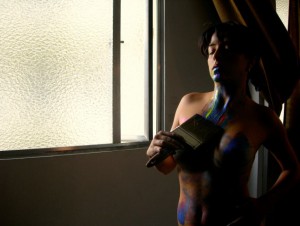One Jewish Feminist’s Lifelong Companionship with a Misogynist
It was 1999 and I was a visiting scholar at a synagogue in Florida teaching a workshop on Ezekiel. Midstream, I found myself saying words I had not anticipated saying to these suburban mainstream Jews: “Ezekiel 16, verse 17 is referring to a strap-on dildo and Ezekiel is referencing the emasculation of God by the collective body of Israel who is assuming the phallic, penetrative role in the divine-human relationship.” Gulp.
I sat there anticipating shock and awkward silence. Instead, I saw the faces of these primarily middle-aged women light up with fascination. And then I was off and running, exploring a “text of terror” with energy and positive excitement. The text is filled with rage, violence and misogyny, yet we were not angry, we were not turning the page over.
About fifteen years earlier, I experienced my own first encounter with Ezekiel 16. My response was outrage at a text in which God was portrayed as a loyal husband in relationship with an adulterous wife. Of course, the woman is always to blame! I read the classic patterns of domestic violence in this text: jealous husband, husband beats up wife, husband feels contrition and brings a peace offering and then it begins all over again. How many women’s lives have been destroyed by jealous husbands?
At first, I was consumed with a desire to expose the horrors of this prophet’s so-called sacred text. But, over the past twenty-five years, Ezekiel has become my (textual) partner and companion. This dark figure from the Babylonian Exile is, I admit, an unlikely and unusual choice of companion for someone who has traversed the pathways of Jewish feminism; yet somehow this biblical figure chose me as much as I found him. My relationship with Ezekiel has led me to understand my journey from anger to compassion, from suspicion to cautious embrace. My experiences as a Jewish woman- whether in the realm of Jewish living and practice; professional Jewish leadership; or Jewish learning and scholarship- are mirrored in the ways in which I have engaged with this prophet.
An Old Story
Ezekiel 16 tells the story of an outcast infant (the people of Israel) who is left wallowing in her own blood in an open field. God passes by and recites: “live in spite of your blood” and then continues on to his next order of business. Miraculously, the young girl survives. When she reaches puberty, God takes note of her again. He “enters” into a covenant with her, washes off her blood, and clothes her. He lavishes upon her great riches and alters her status from outcast to royalty.
Scene Two: Wife Israel is then accused by husband God of infidelity: she spreads her legs to any guy who passes by, she takes the gifts that her husband gave her and shares them with her lovers, and she forgets that it is her husband who brought her out of the ghetto. She even refuses gifts from her lovers, instead offering them gifts for her sexual satisfaction.
Scene Three: Husband God, filled with rage, assembles all of her lovers and strips her naked before them. He abandons her while the mob of men molest, rape and mutilate wife Israel. Only once she is wallowing in her own blood, as she had been as the outcast infant, does husband God take her back.
I first encountered Ezekiel’s story in the 1980s. I was reading the early works of Judith Plaskow (articles that would lead to Standing Again at Sinai in 1990), Ellen Umansky, Susannah Heschel, Ross Kraemer, Judith Hauptman and Christian and pagan thinkers such as Elizabeth Schussler-Fiorenza, Rosemary Radford Reuther, Starhawk and Carol Christ. During the day, I argued with fellow graduate studentsat Harvard Divinity School about the ways that we might reinterpret and transform traditional approaches to Jewish life. In the evenings, I participated in Take Back the Night marches and provided sanctuary in my home for women who were escaping from their abusive husbands. I was angry and felt disenfranchised. What I wanted was to participate in a new Judaism–a Judaism that would have the flexibility and courage to re-imagine God, to rewrite liturgy, to reinterpret Torah, and to recover and re-create rituals that would speak to Jewish women’s experiences.
Jewish feminists began to create that new Judaism in the late 1980s and early 19990s. Along with them, I participated in the creation of new feminist haggadot, I davened (prayed) with the feminized formula: “b’rucha at ya,” I fought with the misogynistic texts of the Torah and the rabbis. At Havurat Shalom in Somerville, MA we closely studied each component and prayer of Shabbat liturgy, carefully determining which texts lent themselves most readily to grammatical changes for female God language, which texts might be shifted in subtle ways to modify the hierarchical nature of God language. During Yom Kippur, I refused to beat my chest during the Vidui, thinking that women were beaten enough in this world and we did not need to add to the violence.
Through these long years, Ezekiel was my enemy–he represented the worst of patriarchal Judaism. So long as our sacred texts depicted God as the husband with all the power and the right to act violently, so long as the people Israel were imagined as the adulterous wife deserving of punishment, there would be little room for a transformation of Judaism. I had to daven in the feminine to say to Ezekiel–I am kicking you out of the room–you no longer have a place in the new Judaism that we are creating. I would not visit Ezekiel for several years.
Transitioning Ezekiel
The inner call to participate in Jewish life through learning led me to pursue a doctorate in biblical studies. I did not have a single female professor or mentor during these many years of coursework and comprehensive examinations. All my classmates were men.
In short, I was immersed in a male world, studying with men about texts produced and interpreted by men.
Each semester there would be a social gathering at the home of one of the students. Most of the men were married, and it so happened that none of the wives were pursing professional careers. Each time I went to one of those events I had to decide: do I go into the living room where the men are sitting and talking about issues that are of interest to me, or do I join the women with whom I had little in common? As I inevitably joined the men, the looks of some of the women (primarily from conservative evangelical backgrounds) did not go unnoticed by me. Eventually, I stopped attending social functions.
It was during this immersion in a very male world that I returned to Ezekiel. This time, I noticed unusual and unique phrases in the text, phrases that did not appear in the invectives of the other biblical prophets. Ezekiel, I realized, was not using the standard idioms for the marriage metaphor. I looked deeper, my own anger at his text moving to curiousity as I wondered what was at the root of Ezekiel’s language and his anger.
Using my new expertise, I was able to discover the meanings of the linguistic oddities in Ezekiel’s text, and to find parallels in Mesopotamian literature. As I dug deeper, I realized that Ezekiel did not just depict wife Jerusalem as being unfaithful. The abomination of wife Jerusalem is that she was attempting to pass for a male (i.e. aggressive, independent), that she was crossing gender boundaries and upsetting the world order. Her behaviors were less characteristic of an adulterous wife and more appropriate to a woman who was asserting her selfhood and independence–behavior associated with masculinity in Ezekiel’s world. In Ezekiel 16, the wife Jerusalem wears the dildo, wields the phallus. Her transgendering is the ultimate transgression.
It is any surprise that my circumstances of “passing as a man” through graduate school allowed me to see what male interpreters had not?
Ezekiel 2000: Misogyny Redux
Fast forward to the year 2004 in which I became the first female academic dean and vice president for academic affairs at an accredited rabbinical seminary, a position that would have been unthinkable when I first met Ezekiel in the mid 1980s. I had earned a Ph.D in biblical studies, had a respectable number of publications, had attained tenure as Associate Professor of Bible, and was the single mother of a preschooler. As the dean of a rabbinical school I hold the responsibility for guiding our faculty and students to think creatively and boldly about the next generation of Jewish life. Jewish women are filling the pews, serving on synagogue boards and committees, serving as rabbis and leading Judaic studies scholars. Women play roles in Jewish life beyond even the dreams that many of us had in the 1970s and 1980s. But are we yet equals?
Well – two years ago, I attended a conference that brought together Jewish leaders and activists. I participated in a panel that included the representatives of several rabbinical seminaries. After the panel concluded, a photographer who worked for the conference gathered all the panelists together for a photo. Two of us were engaged in conversations with individuals who had heard the panel discussion. My colleague was beckoned away to join the photo shoot. I turned around and noticed that I had not been invited. I asked one of the conference staff, what was going on? “Oh, we wanted to get a photo of the rabbis.” That read as code for, “we want a photo of the Jewish men to show the Jewish establishment and future funders that this conference’s participants were authentic mainstream Jews, not marginal ones.”
I was quickly reminded that I am not a part of the old boy’s network, that even at a time when there is concern regarding male flight from Judaism, the old boys’ network still exists. Women may be most involved in living Jewishly, in keeping the pews filled, in active learning, but men still hold the highest positions in Jewish institutions and men still hold the money.
During the same month, I participated in a panel review of a new book on biblical theology at an academic conference. As is usually the case, I was the only woman on the panel. A few weeks later, we were all asked to work up our comments for an issue of a theology journal. We submitted our essays, reviewed the final proofs and then finally received a few copies of the journal. I was aghast to see that the new author of my essay was not Tamar Kamionkowski, but rather Walter Kamionkowski. Then came the apologies, the explanation about a new computer program that must have been responsible for the error, and the news that the journal could not reissue its print copies.
Twice in one month, I played with the big boys and I was rendered invisible in both cases. In fact, I was even given a new male identity! The knowledge that I had produced as a Jewish woman was reassigned to an imaginary male. Put differently, even with all the strides forward for Jewish women, I continue to function in mainstream Judaism and academia by being assigned a phallus or by being rendered invisible.
(fe)Male Trouble
I return to my companion Ezekiel and ask: “What is so troubling you?” He answers me: “We failed as men to protect Jerusalem and our families. We have been shamed by the Babylonian conquerors. We are in a strange new land where women play roles in public life. Why would God take away our manhood? If we have become emasculated, does it mean that women have usurped the phallus?”
Ezekiel chapter 16 begins and ends in a fantasy of an all-powerful God and a completely submissive wife. However, the material embedded within this frame reveals a different dynamic. The center of the story expresses a much more volatile, chaotic relationship– one in which God does not have full control and in which wife Israel is not completely submissive.
This radical admission is made even more radical by the metaphor in which it is expressed. The use of the marriage metaphor beckons us to read this text on more than one level. As we explore the power relationships between male and female, we are, in fact, exploring the power relationships between God and Israel. Israel is both female and male – female in relation to God, and male within the realm of human society. Israel is at once powerful and utterly powerless. The male community, symbolically portrayed as a female, betrays its own maleness in Ezekiel 16. The marriage metaphor is not simply a vehicle, or a vessel for conveying a theological message. Ezekiel’s use of the marriage metaphor embodies an outbreak of chaos. This is a story about cultural upheavals, social disintegration and theological crises, all expressed through the breakdown of one of the most fundamental cultural and social institutions: marriage, and at its root, gender roles.
In our own world in which we boast the breakdown of limited gender roles, identities, and behaviors within progressive Judaism, I suspect that we are still a lot more limited by binary thinking than we want to admit. To the extent that theology mirrors social realities and vice versa, Jewish theology is still very much bound by either male images for God or the explicit rejection of male imagery. As long as we continue to embrace or reject male imagery for God, we continue to be bound by binary thinking that gives power to only one partner of the covenant (God). If we are not willing to be bolder with feminist theology, we may continue to trap women (and men) within a binary world in which the phallus still remains only with men even as women have access to more knowledge and participation in Jewish life.
Ezekiel’s exploration of the gendered dynamics of the chaos of his generation may provide us an opening to be bolder with the development of Jewish feminist theology. Even though Ezekiel did not like it, he was able to imagine Israel taking a dominant role in its relationship with God. In some ways, this prophet from antiquity was able to play with the fluidity of gender roles in ways that are more radical than many progressive Jews today.
As I read Ezekiel now, I find this ancient voice challenging us all with difficult questions (that he did not imagine): What would it mean for Jewish women today to hold true power within the Jewish establishment without being assigned the phallus? Are we willing to consider that it might be healthy to imagine that God may sometimes be submissive? And if we might celebrate submissive aspects of God as worthy of emulation, must this aspect of God necessarily be associated with the feminine? Breaking through the God equals phallus equals male equals power paradigm may help us to break through the continued binary of Jewish living today–a binary in which we are experiencing straight male flight from Judaism except for those men with extraordinary power (emulating God) and in which women who are gaining knowledge and power are either marginalized (kept out of the game), assigned the phallus (made into men) or condemned as threatening Judaism (like the biblical adulterous wife).
As we transform Jewish life, we must transform the ways we think about God. And as our hearts and minds open to new visions of God and our relationship with the Divine, we will find ourselves transforming Judaism in ways that we cannot yet imagine.
![[the current issue of ZEEK]](../../image/2/100/0/5/uploads/leftistethicistgraphic-52842c6a.png)
- 5000 Pages of Zeek
- Founded in 2001, Zeek was the first Jewish online magazine, and we have over 5000 pages online to prove it, all available free of charge. Read more in the Archive.
More articles in
Faith and Practice
- To-Do List for the Social Justice Movement: Cultivate Compassion, Emphasize Connections & Mourn Losses (Don’t Just Celebrate Triumphs)
- Inside the Looking Glass: Writing My Way Through Two Very Different Jewish Journeys
- What Is Mine? Finding Humbleness, Not Entitlement, in Shmita
- Engaging With the Days of Awe: A Personal Writing Ritual in Five Questions
- The Internet Confessional Goes to the Goats




